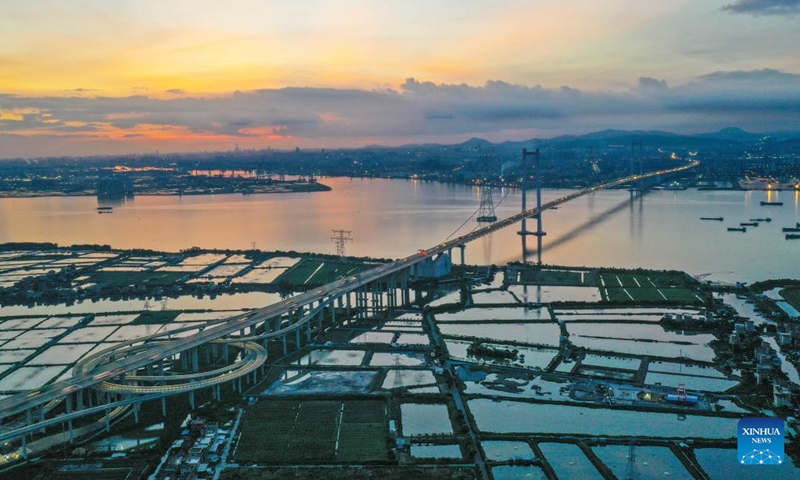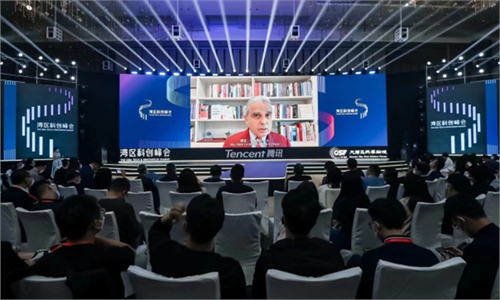China issues pilot travel endorsement policy for talent across Greater Bay Area, 'facilitating regional integration'

Aerial photo taken on June 29, 2022 shows a view of the Nansha Bridge, which links Guangzhou and Dongguan, in South China's Guangdong Province. With the building of traffic arteries, the connectivity in the Guangdong-Hong Kong-Macao Greater Bay Area has been continuously improved. Photo: Xinhua
A pilot policy of issuing travel endorsements for talent in mainland cities across the Guangdong-Hong Kong-Macao Greater Bay Area to the Hong Kong and Macao special administrative regions (SARs) will be implemented starting from February 20 to facilitate personnel communication in the area to engage in scientific research and academic exchange activities, the National Immigration Administration (NIA) announced on Thursday.
Experts regard the policy as playing a "significant role" in boosting regional integration.
There are six categories of talent who will be eligible for the application including talents who either make an outstanding contribution to the area's development or are subject to shortage, including talents in scientific research, education, health and legal sectors and other qualified talents in the Greater Bay Area, according to an announcement released by the NIA.
An eligible candidate can apply for travel endorsement to the Hong Kong and Macao SARs either respectively or together. Outstanding talent could get travel endorsement with the validity period of five years, and qualified talent from the scientific, education and health sectors could get three-year endorsement, while the one from the legal and other sectors could get one-year endorsement, according to the authorities.
They may travel to and from Hong Kong and Macao SARs several times within the validity period, and stay in Hong Kong and Macao SARs for no more than 30 days each time. Excellent talents can submit the applications to any immigration management authority above the county-level in the Greater Bay Area.
Currently, for individual travel endorsement, a qualified applicant can stay in Hong Kong or Macao SARs no more than seven days for each application.
Lin Jiang, a professor from Lingnan College at Sun Yat-sen University, sees the new policy as holding "significant meaning" in boosting the development of the Greater Bay Area. "It provides great convenience for mainland talents to communicate with those in Hong Kong and Macao SARs," Lin told the Global Times on Thursday.
The policy will boost the personnel communication, which will facilitate further integration across the Greater Bay Area, Lin said. It also helps to expand cooperation across various sectors including scientific and technology research as well as business partnerships, according to Lin.
Meanwhile, the convenience will be beneficial for Hong Kong and Macao SARs in attracting high-end talents too, Lin said.
A resident surnamed Liang from the city of Shunde, South China's Guangdong Province, who graduated from a university in Hong Kong, told the Global Times on Thursday that the new policy is a positive development and that she looks forward more incentive policies to further improve the young talent networking and connectivity across the Greater Bay Area.
After working in HKSAR for two years, Liang returned to her hometown Shunde in 2020 for an attractive new role. After the mainland fully resumed normal travel with the Hong Kong and Macao SARs on February 6, many residents like Liang in the Greater Bay Area hope to see more communication and an accelerated economic recovery.
In a survey conducted by Bank of China Hong Kong and the local media through an online questionnaire among 2,722 respondents aged 18 and above from January 9 to 15, nearly 80 percent of the respondents plan to travel and visit relatives in the Greater Bay Area after fully resumption of travel between the mainland and the HKSAR.
Many respondents also expressed their intention to open bank accounts for leisure consumption and daily payments in the mainland, according to local media reports.


